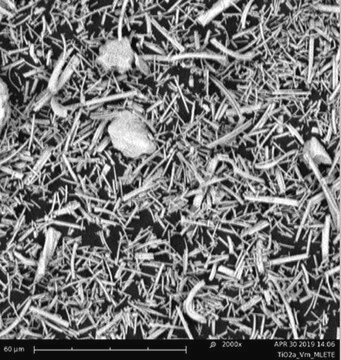267260
Platinum
foil, thickness 0.5 mm, 99.99% trace metals basis
Synonym(s):
Platinum element, Platinum gray
Sign Into View Organizational & Contract Pricing
All Photos(1)
About This Item
Empirical Formula (Hill Notation):
Pt
CAS Number:
Molecular Weight:
195.08
EC Number:
MDL number:
UNSPSC Code:
12141734
PubChem Substance ID:
NACRES:
NA.23
Recommended Products
Quality Level
Assay
99.99% trace metals basis
form
foil
resistivity
10.6 μΩ-cm, 20°C
thickness
0.5 mm
bp
3827 °C (lit.)
mp
1772 °C (lit.)
density
21.45 g/cm3 (lit.)
SMILES string
[Pt]
InChI
1S/Pt
InChI key
BASFCYQUMIYNBI-UHFFFAOYSA-N
Related Categories
General description
Platinum foils may be used to fabricate multi-electrode spiral nerve cuffs. It was found to be the most active catalyst in the kinetic study of catalytic oxidation of alkanes over platinum foils.
Quantity
7 g = 25 × 25 mm; 14 g = 25 × 50 mm
Storage Class Code
13 - Non Combustible Solids
WGK
nwg
Flash Point(F)
Not applicable
Flash Point(C)
Not applicable
Choose from one of the most recent versions:
Already Own This Product?
Find documentation for the products that you have recently purchased in the Document Library.
Customers Also Viewed
Structure characterization of platinum foil for neural stimulating electrodes
Peclin P, et al.
Bio-medical materials and engineering, 24, 1827-1835 (2014)
Kinetic study of the catalytic oxidation of alkanes over nickel, palladiium and platinum foils
Aryafar M and Zaera F
Catalysis Letters, 48, 173-183 (1997)
Shai Rozen et al.
Plastic and reconstructive surgery, 131(6), 1253-1265 (2013-05-30)
Left untreated, paralytic lagophthalmos may result in corneal dryness, ulcerations, and subsequent blindness. The most common nondynamic surgical solution is upper eyelid weight placement in a superficial, pretarsal pocket, carrying the risk of visibility, extrusion, and entropion. The authors present
Wei Sun et al.
Materials science & engineering. C, Materials for biological applications, 33(4), 1907-1913 (2013-03-19)
In this paper a platinum (Pt) nanoparticle decorated graphene (GR) nanosheet was synthesized and used for the investigation on direct electrochemistry of myoglobin (Mb). By integrating GR-Pt nanocomposite with Mb on the surface of carbon ionic liquid electrode (CILE), a
Yuan Xiong et al.
Organic letters, 15(8), 1962-1965 (2013-04-12)
Metal-mediated rearrangements of 3-alkynyl flavone ethers are reported. The overall process involves 5-endo enyne cyclization to a platinum-containing spiro-oxocarbenium intermediate which may be trapped with methanol to produce spirodihydrofurans or further rearranged to afford either allenyl chromanediones or benzofuranones.
Our team of scientists has experience in all areas of research including Life Science, Material Science, Chemical Synthesis, Chromatography, Analytical and many others.
Contact Technical Service

